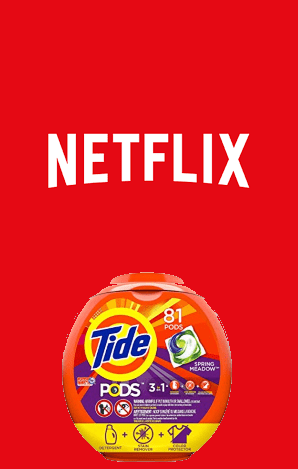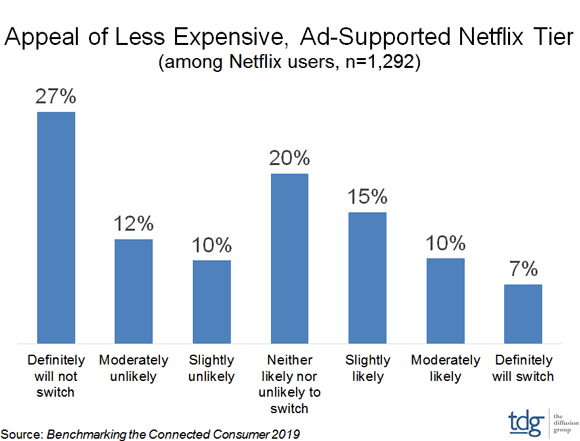
Could this be the Netflix of the future?
Investors concerned about the increasing costs of developing new original content for Netflix have caused a drumbeat for the world’s largest on-demand video streaming company to start running advertising inside TV shows and movies.
A new study finds that almost one-third of Netflix customers claim they would not mind seeing advertising if it meant paying a lower price for Netflix.
The Diffusion Group, based in Los Angeles, asked 1,292 current Netflix subscribers if they would switch to a new, lower-priced Netflix tier that included commercial advertising. Nearly 32% of respondents expressed confidence they would make that switch, with 49% opposed and 20% undecided.
A recent streaming conference in Europe seems to have stoked interest in the concept of an ad-supported Netflix, although the company has repeatedly claimed it has no plans for an advertiser-supported tier, dismissing the idea as a concept dreamed up by their competitors, notably Comcast/NBC and Hulu.
TDG Research president Michael Greeson believes advertising on Netflix is inevitable however, driven by a backlash from Wall Street over how much Netflix is spending on content as it continues to lose access to some of its most popular licensed content, being pulled off Netflix by its competitors Disney and AT&T/WarnerMedia.
“Given the rising costs of programming and growing debt, so goes the argument, it is just a matter of time before the company makes a move,” TDG said in its report.
Netflix’s early days of streaming depended on a deep library of popular movies and TV shows that were readily licensed to the company by major Hollywood studios. But in the last five years, those studios have demanded dramatically higher licensing fees, and in the last year they have ended some contract renewals altogether to reserve content for the launch of their own affiliated streaming services, including Disney+ and HBO Max.

“Netflix’s response to its thinning third-party library is to spend more on originals, which it’s gambling will keep subscribers from jumping ship,” Greeson said. “But with half or more of its most-viewed shows being owned by three studios, each of which is launching their own direct-to-consumer services, how long can you convince 55+ million US consumers that your service is worth paying a premium price, especially compared with Hulu (offers an ad-based option), Amazon Prime Video (free with Prime), and Disney+ (coming in a $6.99/month)?”

Greeson
Netflix has faced growing pressure from investors to reduce the level of debt it has accumulated financing those original productions, including pushes for rate increases and advertising. Netflix raised prices, but has publicly opposed advertising. Some investors now want another rate increase, which Greeson warns would be perilous for Netflix’s subscriber count, because their research found the last price increase “strained the limit of the service’s value.” That research was done before subscribers start to discover their favorite shows will increasingly be pulled off the platform. Greeson believes another rate increase will cause at least some customers to flee, stalling Netflix’s growth.
The happy medium in Greeson’s view is the introduction of an ad-supported tier for price-sensitive subscribers, and he predicts Netflix will introduce it in the next 18 months.
“Ads will become an important part of a comprehensive tiering strategy that helps bullet-proof Netflix for years to come,” Greeson said.


 Subscribe
Subscribe
They need to lower prices, not raise them. They’re kind of outlandish now, and that’s before losing their biggest draws.
After reading that less than 30% of people sign up for ad free Hulu, it’s clear I’m not alone. The pricing is just ludicrous next to Hulu (let alone free services). And helol, some shows I used to watch on Netflix are now on Hulu lol
Not only Netflix, but the other OTT providers like YouTubeTV and DirecTV Now… Personally, I don’t want more channels. I want less. And I want to pay less for that less… So stop adding channels and turning streaming payTV into Cable. It’s not for me. But content owners don’t want Netflix to consolidate and monetize their content. The content owners themselves want to monetize their content. So going forward I see each media conglomerate offering their own streaming bundle, and Netflix / Amazon Prime forced to create their own original content in order to have something to show. Eventually, you’ll… Read more »